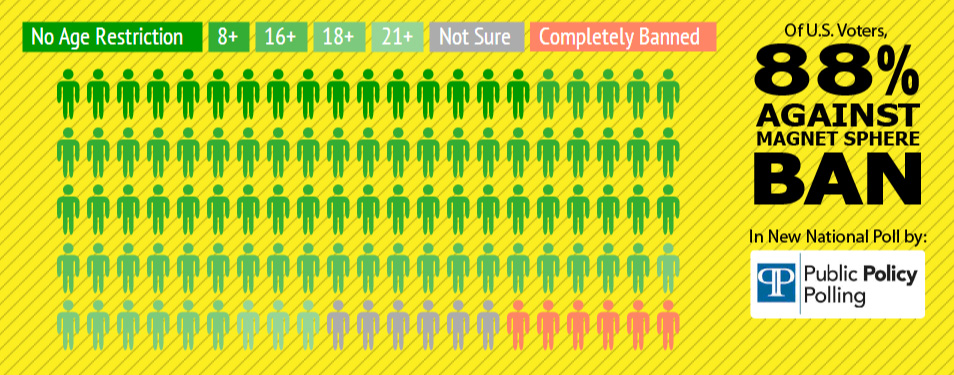Polls Are In, CPSC Ban Really, Really Unpopular.
Posted by Zen Magnets on Jul 17, 2013 in Featured, Press Releases
According to a new national poll conducted by PPP, 88% of those polled say they don’t agree with an all ages magnet sphere ban compared to the 6% who approved the CPSC’s actions against consumer high powered magnet sets. The poll, conducted by Public Policy Polling on July 11 and July 12 of a national sample of 755 registered voters, living in all 50 U.S. states. People were asked the following question:
The Consumer Product Safety Commission (or CPSC) is currently investigating sets of high powered magnets typically used for art, education, and stress relief. The concern is that they are an ingestion hazard to children because magnets can pinch internally once two or more are swallowed, which may require surgery. If all legally required warnings are clearly labeled on the packaging, which of these levels of age restriction do you believe is appropriate for consumer high-powered magnet sets?
The results:
14% – No Age Restriction
44% – 8 and over
19% – 16 and over (on par with motor vehicles)
7% – 18 and over (on par with tobacco and rifles)
3% – 21 and over (on par with alcohol and handguns)
6% – Not Sure
6% – Complete Ban
See the source here. The chart below is interactive.
The same poll shows that 6% of the population would also like a comprehensive ban on one of the following: skateboards, balloons, swimming pools, trampolines. All items which are statistically shown to be more dangerous than magnet spheres, and which are marketed to children [most magnet spheres are not.] In contrast, 21% would rather have firearms, tobacco, or alcohol banned.
Opinions and awareness of the issue were separated by a significant gender gap. Poll results showed that males were twice as likely to be aware of the ban currently in rulemaking process; males were also approximately twice as likely to be aware of CPSC lawsuits against magnet companies, including ones with no history of injury such as Zen Magnets. And males were twice as likely (21%) to prefer no age restriction at compared to (8%) women.
The agency itself has in the past admitted that the magnets in question are safer, and more useful than balloons. When asked how agency credibility would be influenced by banning magnets, the most common response was “negative affect”, however women were more forgiving to the CPSC. Of males polled, 44% said the CPSC’s credibility would be damaged, 29% believed it would make no difference, and 3% expected a positive effect. In contrast, of females 33% expected credibility damage, 32% expected no change, and 7% expected positive result.
The CPSC, under new leadership, continues to spend money and clout to push the magnet prohibition campaign up river, against strong currents of public opinion and past precedent. At the moment, apparent strategy of the new CPSC seems to ignore dissent, avoid discussion, and loudly blare emergency alarms. The threats and lawsuits have been effective, however. There used to be many options to purchase similar magnets in the US, now ZenMagnets.com stands nearly alone.
To date, there have still been no recorded ingestion incidents relating to Zen Magnets which are only sold online. Despite this, the Zen Magnets company has been preliminary punished with implicit legal fees of an administrative complaint due to similarity of magnets sold by other companies [such as Buckyballs in toy stores] which have caused injuries.

